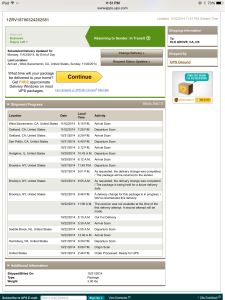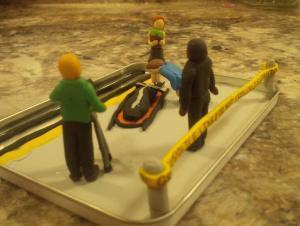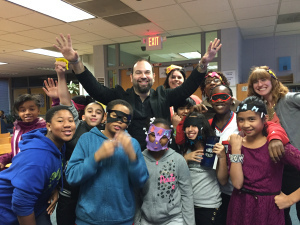Barry Lyga's Blog: The BLog, page 38
December 16, 2014
Interview: Twinja Book Reviews
 I’m interviewed over on Twinja Book Reviews for their Diversity Month. I loved this interview; lots of smart questions that I haven’t been asked before.
I’m interviewed over on Twinja Book Reviews for their Diversity Month. I loved this interview; lots of smart questions that I haven’t been asked before.
Including this one, which I’ve never gotten before:
a few of us fan girls gotta know, are you a Sista on the low [or a] black guy with a Full Blown vitiligo?
If you want to see my answer to that one — and much more, including discussion of Connie, Howie, and Dear Old Dad — check out the interview!
December 15, 2014
The Secret to My Success
Often times, I will be walking down the street when random passers-by will approach me and inquire, “Barry, how is it that you are so successful? What is the secret that makes women weep and men tremble at your approach?”1
I usually modestly brush them off, but I’ve thought recently that perhaps I should share the secret of my success with you, my closest friends on the Internet.
How did I become such a towering figure of renown and fame? How did I come to bestride the world like unto a Colossus? I shall tell you, and the telling you shall be now.
Oatmeal.
That’s right: Oatmeal.
Since the very earliest days of my career, I have eaten oatmeal for breakfast pretty much every single day. Exceptions are made when I’m at a breakfast meeting or when my wife gives me that look that says, I cannot abide watching you eat oatmeal again, so we are going out for brunch.
But easily 300+ days a year, I eat oatmeal for breakfast. I’m a creature of habit and routine.2
And you’re thinking Oatmeal, and I say, Have you been listening? Yes. Oatmeal.
Perhaps you are skeptical. Perhaps you scoff. Perhaps you think there can be no connection between oatmeal and success. But I can tell you this: I’ve breakfasted3 with M.T. Anderson and do you want to know what he ordered?
That’s right, punk: Oatmeal.
If it’s good enough for YA’s own personal Jesus, why isn’t it good enough for you?
Now, realize that when I say I eat oatmeal, I speak not of a simple grayish bowl of mush, as you might see in a production of Oliver! or on a small child’s high-chair tray. Oh, no. I have an elite, special recipe that I will now bequeath unto you, so that you, too, may achieve your dreams. Here we go:
Uncle Barry’s Success! Oatmeal Recipe
1/2 cup Quaker Quick Oats

1/2 cup H2O (“water”)
1/2 cup vanilla almond milk, unsweetened
1 Tbsp honey
1 palmful blueberries, rinsed
1/2 banana, sliced evenly
1 handful chopped walnuts
Combine the oats, “water,” and milk in a microwave-safe bowl. Nuke the combination for one minute and forty-five seconds. No longer, no shorter. Tamper not with the timing.
Add the honey and stir until evenly distributed.
In the following order and only in the following order, add the remaining ingredients: First blueberries, then banana, and finally walnuts.
Stir.
Enjoy your oatmeal and your success. They are both delicious.
You may be tempted to substitute blueberries with, say, blackberries, or a similar fruit. You may be tempted to use the whole banana, or even to replace the walnuts with almonds. DO NOT DO THIS! STRAY NOT FROM THE RECIPE, OR ONLY DOOM AWAITS YOU!
Ahem.
There you go: Now just do that every day for several years in a row and you, too, will walk on water.
Sometimes the women tremble and the men weep instead. I’m not sure why.Someday, I will tell you about the lunch I eat every single day. But you aren’t ready for that yet. Patience. The time will come.“Brokefast?” “Brokefasted?”
December 8, 2014
On Fanfic
In a weird sort of coincidence, I’ve been asked about fan fiction three or four times in the past month. I figure that’s the universe’s way of telling me to blog about it.
So, what are my feelings on fanfic? I’m sure it will surprise absolutely no one at all to learn that they are complicated.
I actually wrote quite a bit of fanfic in my younger years. When I say “younger years,” I mean from the age of fifteen to roughly college. I was a comic book geek and I wanted to be a comic book writer, but I had no idea how to pursue that career. A chance encounter introduced me to the idea of “fanzines,” and the next thing I knew, I was regularly writing fanfic about the New Teen Titans. Not my favorite super-team, but fun and with a more manageable roster.[image error]
Now, with no offense intended to anyone who loves fanfic, I want to explain that I never once thought that writing these stories, well, counted. I was having fun, yes, but I wanted more than just fun. I wanted to be “official.” And a paycheck would be nice, too. I realize that there are great numbers of people for whom fanfic is an end in and of itself. For me, it began as an attempt to get noticed by the pros and write comics for real. (The fanzine I belonged to was known to be passed around the offices at DC Comics.)
But soon enough, it morphed into something else: An opportunity to hone my craft.
I won’t lie to you: So much of that early writing was just plain bad.1 Hell, I was a teenager. Most teenagers — even those with native talent and a facility with words — aren’t going to produce anything wonderful in those early days. My work at that time was typically an attempt to be edgy and dark. Transgressive. Often time, insensitive and offensive. I was a teenage boy — I had angst and pent-up frustration and a disdain for propriety and boundaries, and I bled all of that onto the page as aggressively as possible.
But as the years wore on, I began to see my fanfic as an experience that could improve my overall writing. I came to realize that the idea of someone at DC stumbling upon a copy of the ‘zine, opening it to my story, and thinking, “Good God! I must hire this astounding writer!” was little more than an inane and risible pipe-dream. My fellow ‘ziners, though, seemed to be enjoying what I was writing, and I was beginning to see the advantages of writing in someone else’s universe, with someone else’s characters: The world was built, the players were on the stage, and the relationships were established. I could focus, then, on plot, on language, on dialogue, and on consistent characterization.
My days in fanfic ended when I began writing a massive, sprawling epic tale that would have numbered a couple hundred pages — novel-length, for sure. I realized about halfway through that I had introduced several of my own characters, and that I was enjoying writing them more than the Titans.
This isn’t a Titans story, I realized. It’s my story.
And I haven’t written fanfic since then. Again, not because there’s anything wrong with it or because I look down on it. It’s just that I realized I wanted to tell my stories…and to me, that means my characters, my world(s).
Given my history, it would be hypocritical of me to refuse anyone who wanted it the opportunity to write fanfic of my work. It’s not like I called up Marv Wolfman and George Pérez and said, “Mind if I take a stab at Nightwing and Cyborg?”[image error]
But…I am conflicted about Lyga fanfic.
First of all… Dude, really? I mean, I consider myself a very minor sort of literary figure, so the idea that someone out there wants to fanfic-ify my wordage sort of boggles. It’s like visiting a movie set and asking the key grip for a selfie and an autograph.
But hey, different stroke for different folks. Whatever works for ya.
Second of all… It’s just plain weird to me, OK? Again, I’m not trying to offend anyone, but these are my characters. I bled and wept and vomited them into existence. Having someone else put words in their mouths and give them actions to perform feels like watching someone else raise your child (a simile that strikes home to me more than ever, having recently become a dad). It’s not that fanficcers are doing something untoward or wrong. It’s just…not right.
But I’m no hypocrite. And if writing fanfic of my humble little creations makes someone happy, well, I say the world needs more happy.
I have only two rules:
1) Don’t sell it. Trying to make money with your spin on something I created is a no-no. It’s doucherocket behavior, and you don’t want to be a doucherocket, do you?
2) Don’t show it to me. Seriously. Like I said above, it’s just weird for me. And, worse yet, if I ever ended up writing and publishing something even remotely similar to what you’ve conjured, I could get in trouble. I don’t like being in trouble. I have a kid; she’s enough trouble for me. So, don’t send it to me or ask me to read it or tag me or pester me for my thoughts.
Simple enough, right? Have fun!
And yet, I have sprinkled first pages from three of those stories throughout this piece!
December 3, 2014
Tales of Incompetence: UPS (Part 2)
So, I never wrapped up the story of UPS’s incompetence last time because, well, baby. I will now rectify that.
When last we left this sordid tale, Barry’s iPad was headed back to Apple after UPS idiotically failed to deliver it. A supervisor had promised to have the package intercepted at a UPS facility en route and then overnighted to me. Sadly, that same supervisor had never called back as promised, so screw him.
Anyway, the following day, I noted that — according to the tracking page on UPS.com — the package was just sitting in a facility in Illinois. Having exhausted my patience with the phone, I emailed UPS to say, in essence, “Hey, guys — send this thing to me!”
I got back a response saying, basically, “Gee, we’re sorry you’re having problems! According to our system, your package is being returned to the sender. Please respond to this message if you have any questions or if we can help at all.”
I began tearing out what little hair I have left. I had already told them the problem in my email! I responded, this time quite snarkily, informing them that they could “help at all” by doing as I’d originally asked and overnighting the package from Illinois.
A few hours later, I got an email informing me that, sadly, the package had left Illinois.
Now, I checked online and according to the in-scan and out-scan, the package was at the Illinois facility for several hours. Plenty of time for someone to grab it up and send it back to me, as was promised by the original supervisor.
A few days later, it was back at Apple. I’m sure UPS feels like it’s a job well done.
Here’s a screenshot of the UPS.com tracking page. Notice that there are four separate facilities where the package resides before it gets back to Apple: One in Illinois, three in California. At any of these, the package was supposed to be (and should/could have been) intercepted and sent back to me. But it wasn’t. (Note, too, that it says the package is being returned to Apple “as requested.” I never requested that.)
I made sure Apple refunded my money and then I just went to the damn Apple Store and bought it myself. So much for the convenience of ordering online.
A brief coda: When I called Apple to explain the situation and make sure I got my money back, the guy on the other end of the line groaned audibly when I said “UPS.” He spared no venom in blasting them and their hideously awful practices. So I’m not an outlier.
UPS failed on every possible level and at every conceivable opportunity. This wasn’t merely human error or a computer glitch. It was everything failing, every time. Total systemic breakdown.
It began when the website wouldn’t let me reschedule the delivery, then continued when the phone system similarly failed. Then a human being at the warehouse screwed up and didn’t deliver the package…and someone else at the warehouse did nothing to fix it. Then they accidentally put the package into the return queue…and the customer service people not only didn’t realize this, but dismissed my concerns when I called to have the problem fixed.
And then we get into the supervisor who promised to have the package overnighted…and didn’t. He also promised to call back…and didn’t. And then the fact that the package should have been flagged for immediate return to me was scanned at three UPS facilities, but never pulled aside. And the folks on the other end of my email who delayed long enough that the package left the Illinois facility before it could be sent back to me.
UPS had multiple opportunities to fix this problem. Instead, they failed on every level. I’m not sure how UPS can claim to “love logistics.” They clearly don’t know even know what the word means.
(Since I’ve been bluntly and brutally honest about UPS, I want to make sure I say this much: My actual delivery guy, the dude who drops off packages when UPS bothers to let him, is freakin’ awesome. Love him. Good guy. Lousy company.)
December 1, 2014
Interview: Hemos Unite! Podcast
 I spoke to Matti Vann on the Hemos Unite! podcast. Yes, we talked a lot about Howie, but we also talked about the origins of I Hunt Killers, my writing career in general, and why I don’t think of my work as being for young adults.
I spoke to Matti Vann on the Hemos Unite! podcast. Yes, we talked a lot about Howie, but we also talked about the origins of I Hunt Killers, my writing career in general, and why I don’t think of my work as being for young adults.
Check it out. There’s some introductory housekeeping, but the interview starts at around four minutes in. (Warning: This was recorded before this happened.)
November 28, 2014
Writing Advice #50: Recommended Gear
I recently wrote a series of BLogs on technology for writers and figured it would make sense to summarize the most important bits here in the Writing Advice section. You can go read the originals, or just skim here.
I live in the Apple ecosystem, so some of this may not apply to you. But it’s what works for me:
Desktop Hardware
 I use two monitors, the one built into my iMac and a Dell I bought for cheap online. If you can swing it/have the room, consider a two-monitor setup. You’ll find it lets you spread your work out and organize it more logically.
I use two monitors, the one built into my iMac and a Dell I bought for cheap online. If you can swing it/have the room, consider a two-monitor setup. You’ll find it lets you spread your work out and organize it more logically.
I use an ancient MacAlly iKey keyboard that is no longer manufactured. Even if they did make them, I wouldn’t necessarily suggest you buy one — keyboards are very personal. My advice to you: Find a keyboard that you love, that feels right under your fingertips. Go to stores and try them out. Don’t just type “This is a test of a keyboard.” Stand there for a while and pound out a few paragraphs. You’re going to spend a lot of time on this sucker — make it worth your while. (Even if you use a laptop, you can still get an external keyboard to use when at home. Depending on how much you like or loathe your laptop’s keyboard, this might be a worthwhile investment.)
Ditto for your mouse. I use Apple’s Magic Mouse, which is much maligned in the tech world, but I love it. YMMV.
Oh, and always use some kind of wrist support. You don’t want to blow your tendons out and have carpal tunnel syndrome.
Desktop Software
 My composition environment of choice is Scrivener. Ten million features, but even if you only use six of them, they’ll be the six that change — and maybe save — your life. At $45, it’s a steal.
My composition environment of choice is Scrivener. Ten million features, but even if you only use six of them, they’ll be the six that change — and maybe save — your life. At $45, it’s a steal.
 I use Pages (free with purchase of an Apple computer) in lieu of monsters like Word. It has most of the functionality of Word (and can save to and open .doc files) without the bloat.
I use Pages (free with purchase of an Apple computer) in lieu of monsters like Word. It has most of the functionality of Word (and can save to and open .doc files) without the bloat.
Mobile Hardware
I use an iPad Air 2. I know most people prefer a laptop, but I like the lightness and slender profile of the iPad. If you’re going to use an iPad for your out-of-house writing needs (or, hell, any tablet), invest in a separate keyboard. Typing on glass is fine for emails, but for anything long-form, you gotta have the real deal. I use an Apple Bluetooth Keyboard, but as with the suggestion on desktop keyboards, find one you love.
When you’re traveling, you need to stay juiced up. I use a Phonesuit battery to top off my gadgets when I’m not near an outlet, and I have an XtremeMac InCharge Home power adapter so that I can charge two devices with one outlet. Consider your needs before you head out to the coffee shop for a writing session and make sure you have some kind of power solution in your bag.
Mobile Software

 With Scrivener for the iPad still nowhere in sight, I rely on Textilus for editing and composing on-the-go. I also use Pages on the iPad when compatibility with Scrivener isn’t an issue. Textilus costs only $5.99, but there’s a free version to try out. And Pages is free with the purchase of an iDevice.
With Scrivener for the iPad still nowhere in sight, I rely on Textilus for editing and composing on-the-go. I also use Pages on the iPad when compatibility with Scrivener isn’t an issue. Textilus costs only $5.99, but there’s a free version to try out. And Pages is free with the purchase of an iDevice.
Backup
A good backup plan is crucial for writers. Yeah, I know, you’re thinking, “I’ve never lost anything!” Guess what? That means you will.
There are a lot of backup solutions out there — too many for me to advise you specifically — but here are some general rules to follow:
1) Backup locally to a hard drive in your house or place of work. Have this happen automatically at least every hour.
2) Also, backup to a remote location. This can be a cloud-based service such as Backblaze, Carbonite, Crashplan, or some other one. But do it. You need an off-site backup in case something wipes out your computer and your on-site backup.
3) A backup that requires you to do something each time — push a button, plug in a drive — is no backup at all. You will forget. And the time you forget is the time your hard drive will decide to die, losing that chapter you just wrote. Your systems need to work automatically, without intervention from you. The best backup is the one you never think about…until you need it.
Now’s the time of year for gifts, so maybe surprise yourself with a new toy and get to writing!
November 27, 2014
Thankful
What am I thankful for? My wife, my amazing new baby girl, and my readers.
Oh, and also cool-ass school projects like the one from a reader who decided to recreate one of Game‘s crime scenes. (I bet someone got called down to the principal’s office!)
Happy Thanksgiving!
November 25, 2014
Visiting Chicago
A couple of weeks ago, I visited suburban Chicago (Burr Ridge, to be precise), to visit a couple of schools and also participate in the closing of the 9th Annual Write-On Literary Festival.
I began the morning at Hinsdale South High School, where the main topic of conversation was — surprise! — I Hunt Killers, along with my list of Disturbing Serial Killer Facts that I like to trot out at such events. (I always get a kick out of picturing dinnertime conversation that night at the kids’ houses.) It was a good time, especially when the school librarian introduced me to the kid who approached in a crowded hall and shouted, “Hey, do you have Boy Toy?” (Remind yourself that italics don’t come across in conversation and you’ll understand why the librarian hurriedly said — very loudly — “Why, yes, the library does have a copy of the novel titled Boy Toy.”)
Then I headed to Burr Ridge Middle School, which was a treat. I don’t go to a lot of middle schools because most of my books aren’t really aimed at that age range (something that will change soon, he said mysteriously…). The kids there did an absolutely wonderful job decorating the library for me. Check this out:




Isn’t that some gorgeous artwork? I had so much fun there, talking about Archvillain and The Astonishing Adventures of Fanboy & Goth Girl. This also happened:
Today, met a middle-schooler who’s reading GAME. I’m going to hell, aren’t I?
— Barry Lyga (@barrylyga) November 13, 2014
Some of the kids made their own superhero masks, too, and then let me stand amid them like a Kirby character, arms outstretched.
That night, I headed off to Indian Prairie Public Library to speak at the Cool Compositions ceremony for the Write-On event. After my little spiel, I was honored to get the chance to hand out nine awards (three awards in categories for short stories, poetry, and comic books), generously donated by the Gift of Carl (who also sponsored my trip in the first place).
All in all, it was a terrific trip, with lots of variety and some great, cool kids. Thanks to everyone at IPPL, Burr Ridge Middle, Hinsdale South High, and Gift of Carl for making it possible!
Something Else I Should Have Confessed To…
After yesterday’s post, I heard from some other authors. They said things like this:
@novaren @barrylyga YES. Everything you said, Barry.
— Malinda Lo (@malindalo) November 24, 2014
Other folks chimed in, as well, with similar sentiments, making me realize that in my confessional zeal, I neglected to mention something good in all of this.
Namely, that, for all the chaos and upheaval in publishing, the fact remains that it is still a field in which any random day can possibly bring a staggering life- and career-changing moment. Your book can be plucked from obscurity to be mentioned on a TV program. A hot actor can be glimpsed with a copy tucked under his arm. A movie producer can happen upon your book and decide that this will be her next big project. Suzanne Collins wrote other books before The Hunger Games, y’know.
These things don’t always happen. They don’t happen to and for everyone. And they don’t happen often. But they do happen. And they can be game-changers.
I have a book coming out in the summer. And another coming out after that. And I am confident that I will sell more after that one. The apocalypse isn’t here quite yet, and while I can write, I will write.
So, I’m not going anywhere. Every book is a new opportunity, and I’m gonna take as many of them as I possibly can.
November 24, 2014
The End of My Career

Anyone who knows me well will tell you that I have a general and ingrained distaste for what I think of as our “confessional culture.” Which is to say, people very publicly (and often quite loudly) spilling their guts about their fears, misgivings, mistakes, and daily dissatisfactions.1 It’s just not something I’m comfortable with.
Maybe it’s just the New England stoicism of my forebears. My grandmother, dying and in unimaginable pain, once received a friend who also possessed a constellation of health issues. Thinking they could bond over their mutual ailments, the friend proceeded to reel off a string of her own horrors, then waited for my grandmother to reciprocate.
My grandmother, with infinite calm, said, “Sometimes, dear, it’s good not to let people know how much it hurts.”
Then again, I descended from New Englanders, but not WASPs. So maybe it wasn’t hearty Puritan stoicism so much as old-school Catholicism. Confession is between you and your priest (and God, if He’s eavesdropping). If you’ve shaken off that old-time religion, then confession is between you and your therapist. Your spouse. Your best friend. Confession is not something for the Internet and any number of strangers.
But here I am anyway. Sorry, Gramma.
And when I push “Publish” on this piece, I will probably suffer an enormous wave of self-loathing and regret. But so be it.
Bless me, Father, for I have sinned. This is my confession: I’m a little scared.
No, wait, let’s backtrack. “Scared” is misleading and overly dramatic, but it probably did its job and got you to keep reading.
I’m not so much scared as…concerned. Wary. Because the times they are a-changin’ and the tide it is a-turnin’ and whether I drop the gs on my participles or not, there’s nothing I can do about it.
The last decade or so has seen massive structural changes and disruptions in pretty much every industry you can imagine, but the ones most devastatingly hit are the ones that traffic in the arts. With the exception of something like, say, sculpture (where the value of a work of art lies in its physical presence), most industries that sell art are in the business of selling copies of an original. With the advent of digital, it’s become cheap and easy to make and distribute such copies, to the point that piracy and downward pressure on prices have — perhaps oxymoronically — improved both signal and noise, resulting in changing demands, changing payment, and changing capacity.
In short: Publishing — like most industries — is undergoing tectonic shocks, and the post-tremor landscape doesn’t look promising to me.
I always figured my career would end on my timetable, at a time of my choosing, but I’m not so sure any more.
I recently read Ben Thompson’s piece about differentiation at his Stratechery blog. The nut of it is this: In order to succeed as an artist, you have to be massively differentiated. You have to have something no one else has and it has to be highly desirable. Thompson talks a bit about Taylor Swift’s recent decision to pull her music from Spotify, pointing out that it’s a viable strategy for her because “for her (many) fans, Swift is ‘the one.’ She is, to put it in economic terms, highly differentiated.”
In other words, there is incredibly high demand for what Swift produces (her particular kind of music) and she is the only source for it. Consequently, she can dictate terms. “It’s a tough standard, to be sure,” Thompson admits, “but as a consumer, it’s actually pretty great news. Only the best will succeed.”
Extrapolate out from Taylor Swift to art in general and you can see the trend: The big will get bigger and more popular, but the smaller folks will fade away; they’re simply not in demand enough to be able to dictate viable terms. Thompson says that “only the best will succeed,” but — with no insult intended to Ms. Swift — I think it’s not too difficult to envision a future in which not necessarily the best succeed, but rather the first. Or the loudest. Or the richest.
But hey, let’s stipulate that — despite historical evidence — only the best will succeed. What percentage is “best?” Is it the top 1% of artists? Or 10%? Or 0.1%? Who knows? An interesting abstract question, to be sure, but it’s damn personal because I’m pretty sure I don’t fit into whatever percentage you pick.
If you’re reading this BLog, then it’s because you know who I am. You may know me personally or you may be a reader. In either case, there aren’t very many of you. Not enough to sustain a Taylor Swift-level of differentiation. And that’s what worries me. I wonder what place I will have in the New World to Come. What will my career look like? Or will it just peter out?
Now, at this point, some people will say that I’m writing this not necessarily in a confessional vein, but more as a self-pitying cry for love and attention, that I anticipate the comment thread filling with people proclaiming their adoration for my books: “I love your work, Barry!” “I’ve bought everything you’ve ever written and plan to buy everything you ever write!” “You’re my favorite author!”
Yeah, no. I’ve turned off comments for this post. So there. This really is just me indulging in the very uncharacteristic act of public musing. I don’t know what the future holds. I don’t know what comes next or where the off-ramp is.
No matter how big a fan of mine you are or no matter how fond of me you may be personally2, you have to admit: If there’s a Taylor Swift of publishing, it ain’t me.
The world is changing. The industry — my industry — is changing. And just because things used to work a certain way and work that way right now, as of this moment, there is no guarantee that they will continue to do so.
Those who made a killing from the record business of yesteryear, should count their lucky stars that it ever happened in the first place.3
Now, once again, like Thompson, Kaplan is talking about the music industry. But the music industry, for purposes of our discussion today, is the canary in the coal mine. As goes music, so too go TV, movies, and books. Music just got there first, is all. But the problems and the opportunities4 of the digital age come to all of us, eventually.
Kaplan continues:
The record business as most people know it, was just a short hundred-year blip in the 40,000 year history of the music business. A stopgap to solve a temporary problem that existed between the invention of sound recording (1890’s), and the invention of the internet (1990’s).
Few other art forms lets artists get rich off copies of their art.
I don’t particularly care about being rich. “Rich,” to me, always seemed like a hell of a hassle. And I know some rich people and they don’t seem much happier than I am. A little less stressed, maybe. But no happier. And the stresses I see in myself that I don’t see in them are most likely masked or replaced by stresses the wealthy have that I can’t imagine.5
What I care about is this: I write a book. You read it. Somewhere in there, there is enough economic alchemy that I can keep a roof over my head and adorable footie pajamas on my daughter. That’s it.
Seems simple, right? And for almost ten years now, it’s worked pretty well for me. But given the herky-jerky of the economy (global, national, and local), as well as the constant disruptions and upheavals wrought by the incursion of the digital into the analog, I fear that this very simple model will not last for long. In fact, I’m convinced that within the next five to ten years, it will be impossible to make a living doing what I’m doing, with the sales I currently command.6
I’m not saying that publishing will end, mind you. I’m saying that the model that has allowed people at my level to make a living in this business will transform enough that we won’t be able to do so any longer. Your major figures will still do quite well. Like Taylor Swift, they are hugely differentiated; their popularity and history of sales will buoy them up through and beyond the transitional disruptions.
Who are these people? You know them, of course. There are signs, I believe, that indicate you will have a career as long as you’d like. You know these signs, even if you’ve never really internalized their meaning.
If your books routinely debut on the bestsellers lists…
If you win one or more of the big awards, the ones that people pay attention to…
If you regularly have your work adapted into movies and/or TV shows…
If any one of these or any combination of them apply to you, the odds are that you will be able to publish books for as long as you choose to do so. And should you choose not to do so, people with money will come to you and show you that money and ask you to please reconsider.
Absolutely none of those criteria apply to me. Hence my wariness, my concern. Because in five to ten years, what the hell am I going to do with myself? I mean, sure, I guess I could put on a tie and dust off my résumé and look for real work, but who’s gonna hire a middle-aged dude who’s been out of the workforce for a decade or two?
And besides — selfishly — I like what I do. I like being creative. I’m good at it. And it’s nice that I can make a living at it. But even though I feel like an old, old man (and Leia makes me feel older every day), the fact of the matter is that — barring sudden illness or a decline in my mental faculties — I probably have another four decades of productive writing time in me.
How much of that will I get to exploit?
So… Movies? TV? Videogames? Comic books? Well, sure. Maybe. But all of those are intensely collaborative efforts, and I’m not the most collaborative guy in the world. (Ask poor Peter Facinelli and Rob DeFranco was it was like to work with me on After the Red Rain. Or ask any of my editors, who no doubt have gnashed their teeth down to the gums after going ten rounds with me over the disposition of a semi-colon.) Plus, there are people already doing those jobs. I can’t just say, “I used to make a living writing novels. Now shove over and give me some of that sweet, sweet TV cash!”
“Self-publish,” people say, as if it solves anything. Well, I tried that. And I’m happy that Unsoul’d is out there in the world, but its sales aren’t anywhere near my sales on my books published by the dreaded “big New York publishers.” If I had to rely on self-publishing income, I’d be eating cat food. The dirty little secret that successful self-publishers won’t tell you is this: Success at self-publishing is just as much a crap-shoot as success in “real” publishing.
This isn’t an indictment of self-publishing. It’s just the facts as they pertain to me. My fan-base is not large enough to support me without the help of a big publisher. And in the New World to Come, I’m not sure that big publishers will continue to help authors of my…stature? Rank? Type? Level? I’m not sure of the right word, but you get my point. As publishers continue to strive for relevance and stability, they will inevitably hew to the Taylor Swifts of the publishing world. Small publishers will continue to thrive through dedicated fans and lower expenses…meaning smaller advances that authors can’t live off of.
Being an author not in the top tier of earners will mean that “writing” is something you do on the side, as an adjunct to your “real job.”
I’m not saying anyone owes me (or those like me) anything at all, up to and including book sales, a reliable income, or eyes on my books. I’m simply saying that I look at the current landscape, I look at the historical trends, and I look at the most obvious future permutations of the industry, and what I see worries me.
My grandmother was right, as she often was: Sometimes, it’s nice not to let people know how much it hurts. Then again, sometimes you take to your keyboard and spill your guts anyway. Because you feel compelled to say something and you figure no one reads your blog anyway and hey, we live in a confessional culture now, like it or lump it, so maybe it’s time to join the crowd.
That’s my confession, Father. Whatta you got?
I am not, for the record, talking about people who are declaiming various social injustices. That’s not the same thing, so please hold off on the “Barry Lyga thinks victims should stay silent!” outrage.Hi, Mom!Bold in original.And make no mistake: The opportunities are legion!I know, poor rich people, right? But hey — money brings its own set of problems. Let’s not pretend otherwise.I could be overly optimistic. It might not even be five years. I’m a writer, not a prophet.
The BLog
- Barry Lyga's profile
- 2185 followers






